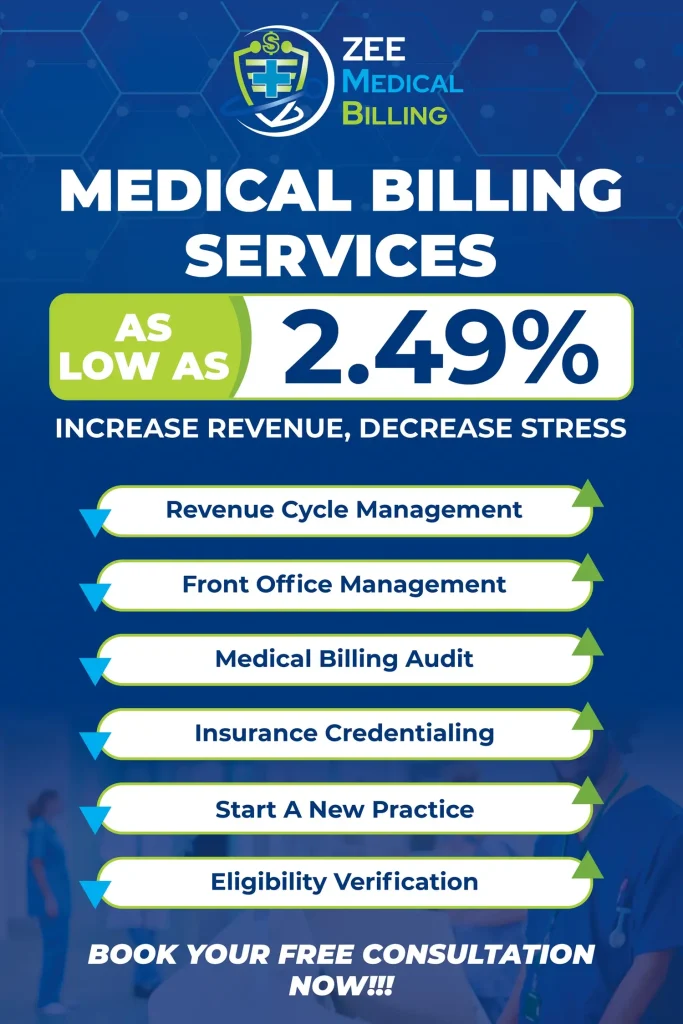Understanding how preventive and immunization billing works is essential for every healthcare provider. Preventive care is crucial for patient wellness. This includes annual checkups and routine vaccines. Billing for this care is just as important as providing it.
In this guide, we’ll explain preventive care billing and immunization billing in simple, human language. You’ll learn what to watch out for, how reimbursement works, and why proper documentation matters.
What Is Preventive Services in Medical Billing?
Preventive services include medical care that focuses on disease prevention and early detection. Healthcare providers offer these services when a patient does not show any signs or symptoms of illness. Examples include:
- Routine physical exams
- Immunizations
- Screenings (e.g., cholesterol, blood pressure, diabetes)
- Counseling for tobacco, alcohol use, or obesity
So, what are preventive services in medical billing? The documentation and claim process for these kinds of proactive care is essential. Unlike diagnostic or emergency services, preventive billing often follows different rules and reimbursement policies—especially under Medicare and most private insurers.
Read More: Wound Care Meaning, Terms and Medicare Billing Tips
The Basics of Preventive Care Billing
Billing for preventive care can be confusing. It often depends on several factors. These include patient eligibility, insurance type, age, and risk category. The goal is to ensure accurate payment while staying compliant with payer requirements.
Key Considerations:
- Verify eligibility: Check whether the patient’s insurance covers the specific preventive service.
- Use the right diagnosis codes: Preventive visits often require Z-codes that indicate routine care.
- Understand frequency limits: Many payers cover preventive services annually or every few years.
- Avoid unbundling: Don’t bill separately for services included in a preventive package.
Proper preventive billing solutions can help reduce denials and ensure timely reimbursements.
Immunization Billing Explained
Vaccines are among the most common and essential preventive measures. However, immunization billing involves more than just a single code. It typically includes two components:
- The vaccine product (the actual medication)
- The administration service (giving the shot)
Both must be coded and billed correctly to receive full reimbursement.
Example:
- Vaccine Code (CPT): For the specific type of vaccine (e.g., influenza, tetanus)
- Administration Code: Indicates how the vaccine was administered and the patient’s age
Understanding this structure is essential for clean claims and accurate medical billing for vaccines.
Common Challenges in Vaccine Billing
Even with the best intentions, vaccine billing errors are common. Here are some issues providers face:
- Missing administration codes: Billing only the vaccine without the administration service
- Incorrect patient age modifiers: Some codes change depending on whether the patient is under or over a certain age
- Poor documentation: Not specifying the vaccine type, lot number, or patient consent
- Confusion with bundled payments: In some cases, vaccines are included as part of a preventive visit
Having the right systems in place can make a significant difference in minimizing these challenges.
Medicare and Preventive Vaccine Reimbursement
Medicare Part B and D both cover vaccines, but with different rules:
- Medicare Part B generally covers vaccines like influenza, pneumococcal, and hepatitis B (for high-risk patients).
- Medicare Part D may cover other vaccines, such as shingles, under pharmacy benefit plans.
Understanding the distinctions between these parts can help ensure proper vaccine reimbursement services and avoid unpaid claims.
Tips:
- Know which vaccines are covered under Part B vs. Part D
- Bill the correct entity (provider vs. pharmacy)
- Check whether your facility is enrolled with Medicare for the relevant services
Why Preventive and Immunization Billing Requires Special Attention?
Many practices underestimate how complex vaccination billing can be. Staying updated with payer policies, ICD-10 codes, and coverage criteria matters just as much as understanding CPT codes does.
With the increasing focus on wellness and preventive care, accuracy in preventive health billing solutions directly impacts practice revenue. That’s why having a system or partner that understands these nuances matters.
Read More: Understanding Ambulatory Medical Services in Medical Billing
How Zee Medical Billing Supports Preventive and Immunization Billing?
At Zee Medical Billing, we understand the complexities of vaccine billing services and preventive care billing. Our team helps healthcare providers streamline their billing workflows, reduce errors, and improve claim approvals. We focus on what matters most: clarity, compliance, and consistent reimbursement.
We help all types of healthcare practices. This includes primary care, pediatric clinics, and family health centers.
We offer insights and billing support. This helps you manage your preventive and vaccine claims accurately. We do not provide medical coding services. However, we offer reliable billing practices that meet current payer and Medicare requirements.
FAQs
1. What’s the difference between preventive and diagnostic services?
Preventive services are routine and meant for early detection, while diagnostic services address existing symptoms or conditions.
2. How do I know if Medicare covers a vaccine?
It depends on whether the vaccine falls under Medicare Part B or Part D. Flu, pneumonia, and Hepatitis B (for high-risk) are typically covered under Part B.
3. Can I bill for both the vaccine and the administration separately?
Yes. You must use both codes — one for the vaccine product and another for administration — to receive full reimbursement.
4. What should be documented for immunization billing?
Important details include the vaccine name, manufacturer, lot number, expiration date, injection site, and patient consent. These are needed for correct billing.
5. Why are preventive services sometimes denied?
Denials may happen because of incorrect coding, lack of medical necessity documentation, or exceeding the covered frequency limit.
Conclusion
Navigating preventive care billing and immunization billing doesn’t have to be stressful. By understanding how insurance and Medicare manage these claims, your practice can stay compliant. A reliable billing process helps you get paid faster.
From verifying eligibility to understanding vaccine billing structure and reimbursement rules, every step matters. Let Zee Medical Billing be your trusted resource for insights and dependable billing support.
Explore more tips and healthcare billing knowledge on Zee Medical Billing.
Need Expert Medical Billing Services?
Zee Medical Billing provides professional billing solutions tailored to healthcare providers across the United States. In addition to offering top-tier support from our main office, we proudly serve clients in Illinois, Indiana, California, Kentucky, New York, Washington, Georgia, Alabama, South Carolina, Texas, Pennsylvania, Ohio, New Hampshire, Nevada, Massachusetts, Hawaii, Arizona, and Colorado! Whether you’re looking to streamline your revenue cycle or improve claims accuracy, you can reach out to us to learn more about how we can support your practice.









